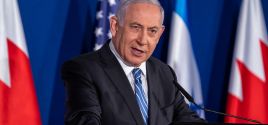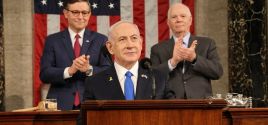The Zarqawi affair, part 11 of 23By B. J. SabriOnline Journal Nov. 16, 2006 |
Popular 
Lufthansa Fined Record $4M for Alleged 'Discrimination' Against Jewish Passengers

Netanyahu Won't Commit to Not Striking Iranian Nuclear or Oil Sites But Will 'Consider' U.S. Warnings

'Anti-Cancel Culture Conservatives' Seek to Cancel Writer Chris Brunet for Criticizing Israel

U.S. Spends Record $23 Billion On Israel Since Oct 7

'The First Live-Streamed Genocide': Al Jazeera Documentary Exposes Israeli War Crimes in Gaza
 "I was going to -- I pick up the phone and say, Mr. Secretary, I've got an interesting question. This is what delegation -- I don't mean to be dodging the question, although it's kind of convenient in this case, but never -- I really will -- I'm going to call the secretary and say you brought up a very valid question, and what are we doing about it? That's how I work. I'm -- thanks.” --President George w. Bush answering a question from a Johns Hopkins’ first-year student in South Asia studies about what law governs the actions of private military contractors in Iraq, Washington, DC, April 10, 2006 [A must watch video] In part 10, I asked the question: why does a majority of Western thinkers -- right and left, but specifically imperialist and Zionist thinkers -- consider the struggle (Jihad) against U.S.-Israeli imperialism, colonialism, Zionism, domination, and occupation, an abomination? There can be only one answer: the concept of Jihad as used by Arab Muslims to fight U.S.-Israeli imperialism is the barrier to implement colonialism. Thus, when the ideologues of empire use that the word, they take it out of its linguistic context and apply it solely on a manufactured concept of an Islamic “holy war” to stress the “fanaticism of the Arabs vis-à-vis the secular mentality of the West.” But neither fanaticism nor secularism is the motive for colonialism. Consequently, the Western-Israeli use of the word, Jihad, is nothing more than an ideological war against Islam to cover up a neocon hegemonic colonialist thrust against the Arabs and other Middle Eastern nations -- all of which are Muslim. But to wage a war to eradicate Islam thus implementing neocon colonialism is a lost battle from the start. Historically, and as far as it concerns wars against religions, there are precedents that the American regime must never ignore -- no empire or power has ever won the battle to eradicate an ideology or religion: Rome failed, the Soviet Union failed, and so will the United States. Then, what is the story with the word, Jihad? In line with early Islamic traditions, Arab Muslims (throughout history, and because they are missionary monotheists as Christians and Jews) used the term “Jihad” to describe their venture to spread Islam. Accordingly, the term meant, “Struggle for the cause of Islam.” Dialectically, there is no difference, whatsoever, between Jihad for Islam and Jihad for Christianity. Both adherents to these two religions followed with excruciating zeal the drive to either Islamize or Christianize. And both adherents followed similar courses to spread their faiths; but the great verifiable difference that, unlike the European Christians, the Arab Muslims never used genocide as means for conquest. Then, where is the problem with the word, Jihad? Logically, and as far as it concerns the spread of religions, there should be no problem with that term. In deed, from the rise of Islam in the 6th-century until after the Israeli war against Egypt, Syria, and Jordan in 1967, I read nowhere that Western thinkers deemed the word, Jihad, as being belligerent against the West. Jihad, however, became a problem when Arabs under siege (Palestinians, Lebanese, Syrians, and Iraqis) began using that term after the establishment of Israel in 1948 and the Israel-American wars against the Arab states in 1967, 1973, the invasion of Lebanon, and the Gulf War Slaughter. Consequent to the anti-Arab policies of the United States in the Middle East, the term, Jihad, has become a rallying cry by some Arabs to defend their existence from imperialist piracy, the scourge of Zionism, and from colonialist ambitions. I must note though, that Western imperialism -- including their dominant culture -- have translated the word Jihad as, “holy war.” This is pure propaganda. To describe a war as a “holy war” in Arabic, one has to say, “Harbb muqadassa”; but this diction is not even mainstream in the Arab culture or tradition. Besides, the Arabs never considered war, any war, as holy; and since the time of Mohammad, no Muslim has ever used the phrase “holy war” to depict the Arab Islamic wars. But did the word Jihad ever rally the Arab Muslims in their struggle against U.S. imperialism and Israel? No. it never happened in modern times. Many Arab leaders called for it, including President Saddam Hussein, in the intended western concept, as a tactic to deter the American threat of aggression, but all failed. The point is that Jihad has never been a call for war. So, where did this propaganda name of a “holy war” come from? Answer: from the Crusades; in other words, European and American imperialisms borrowed from their cultural heritage the phrase “holy war” and pinned it on the word, Jihad, to confer a sense of fanaticism by the Arabs. Conclusively, the emblematic use of the word Jihad by Arab Muslims philosophically connects to the large purpose of defense against Western predation. Consequent to this struggle, the Zionist idea that Arabs, be they Muslim, Christian, Jewish, secular, Gnostic, atheist, or other are religious fanatics because of the current re-use of that term to fight against imperialism is the crux of the problem. This artificially politicized and propagandistic ascription to the term “jihad” as a “synonym” with violence has become the platform upon which Christian fanatics, Zionist Jews, and imperialists of all nations, built their offensive against the Arabs to the point that the word “Jihad” now means, “Islamic terrorism.” Nonetheless, I hold the firm conviction that the ongoing wars undertaken by the United States, Israel, Britain, France, Germany, and minor NATO vassals (while Russia and China are right behind approving in the shadows) against the Arabs are not against Muslims or Islam. Instead, and to reconfirm many earlier statements, these are wars against the Arabs as people, as owners of immense wealth, and as organized states with the purpose to re-colonize them. Categorically, while this is a fake war against Islam, it is a true war for colonization. To prove this point, the forced conversion of the Original Peoples of the Americas to Christianity never stopped the European settlers from exterminating them or colonizing their territories. As a result, what Zionist Samuel Huntington called, “clash of civilizations” is not, at all, as such. Based on the modalities of this “clash,” there is no other way to describe it except that it is an existential war between two camps: a camp that wants to be hegemonic neocon colonizers (the United States, Israel, Britain, Canada, France, Japan, Germany, and other Europeans), and a camp that rejects Bush’s style colonization (Asians, Africans, and Latin Americans.) Having established the nature of the war that the United States unleashed against Iraq and the Arab world, we shall examine next, how Cohn, a jurist and a professor of law, determined that Iraq became a fertile ground for “Jihadis.” Did she and other neocons and imperialists conduct an “ideological census” to reveal the motives of those who oppose the U.S. occupation of Iraq? In part 10, I asked the question, “How, and based on what factual evidence did Marjorie Cohn determine that Iraq became “fertile ground” for “Jihadis”? Is there any census or statistical yardstick by which a professional jurist such as Cohn can reach such a conclusion? I shall answer this question by reprising my count of critical observation (previously stopped at five.) Six: To prove her allegation that Iraq has become a nest for “Jihadis,” Cohn cites no other than the hyper-imperialist paper: the Financial Times. What did the Financial Times claim? It claimed that, “Many Saudi Arabian Islamists have crossed the border into Iraq to prepare for a holy war against the U.S. /U.K. forces.” Notice how Zionists and imperialists vouch for each other about the claims they make. First, how did Cohn or the Financial Times ascertain the citizenship of those who crossed into Iraq? Argumentatively, where are the visa records of an occupied Iraq to prove such a matter? And did these Saudis tell the Financial Times, “We are Saudis and we are entering Iraq to wage a holy war against the U.S. /U.K., and these are our weapons”? Seven: Cohn cited that “al-Arabia” broadcasted a statement purportedly by al-Qaeda, which urged Muslims to travel to Iraq, etc. Cohn tried to convey the idea that mentioning the name of an Arabic satellite TV would confer credibility to her story. For the record, Uncle Sam is the co-owner and financier of the Emirati “al-Arabia” TV station since after the invasion of Iraq 2003. The U.S. made the acquisition to silence the station that was critical of the war against Iraq. Accordingly, al-Arabia reports are of no value to judge Iraqi events since American manipulators prepare them. Particularly, by reporting that al-Qaeda was planning attacks on the occupation force in Iraq, and by using words such as Jihadis, Cohn adds more to our certainty that she was on an indoctrinating trip to tie al-Qaeda to Iraq and mass-circulate that notion through the website: Jurist, of which, she was a contributing editor at the time of publication. Eight: Cohn claimed that, “Osama bin Laden has long decried the United States’ role in the first Gulf War, the punishing sanctions against the people of Iraq, etc.” False: Osama proposed to the United States that he and other former Muslim fighters from Afghanistan liberate Kuwait from the Iraqi occupation with guerrilla warfare just like the one they waged against the Soviets in Afghanistan. George H.W. Bush refused. In addition, Bin Laden, was an acidic hater of Saddam Hussein, and never cared or made any statement on the plight of the Iraqis, until the United States began accusing him for 9/11. Cohn, therefore, was building the case for the presence of al-Qaeda in Iraq, hence, Zarqawi who, as I said repeatedly, was yet to be born as the al-Qaeda leader in Iraq. Nine: When Cohn Stated that, ” In the twisted minds of the terrorists who likely executed the worst attack on a U.N. civilian operation in its 58-year history, the United States and the United Nations are linked,” she flagrantly suggested a link between al-Qaeda and the U.N. attack. Did Cohn provide any proof that “terrorists” carried out that attack? The answer is no. Cohn depended first on the bottomless repertoire of deception – she improvised as a psychoanalyst, then she penetrated the minds of “terrorists,” and finally, she decreed: “In their twisted mind . . ." Now that we finished discussing prelude number 1 (the attack against the Jordanian embassy), and prelude number 2 (the attack against the United Nations), we shall tackle next the most significant and lengthy among the preludes to the Zarqawi hoax: the assassination of Shiite cleric, Mohammad Baqir al-Hakim. Prelude 3: the assassination of Mohammad Baqir al-Sadr From any way you look at it, the assassination of the Shiite Cleric Mohammad Baqir al-Hakim is the most significant prelude to the official debut of the Zarqawi hoax. I would even suggest that to understand why the United States created Zarqawi, we must study first the reasons for which it killed al-Hakim. Consequently, I am going to dedicate a few parts of this series to explore the relation between Hakim’s assassination, the objectives of the American occupation of Iraq, and the emergence of “Zarqawi.” On August 19, 2003, and in a rapid escalation of military attacks against targets that, strangely enough, were amenable or in collusion with Washington (Jordanian embassy and the U.N. mission), U.S. military terrorism in Iraq turned attention this time against its erstwhile convenient ally: Shiite cleric Mohammad Baqir al-Hakim. As stated earlier, the assassination of al-Hakim was an extremely exacting strategy aimed at igniting a confessional war between Iraqi Muslim Arabs. The other reason was, to introduce “Abu Musaab al-Zarqawi” by building up a string of terrorist attacks and then attribute them to an imaginary al-Qaeda organization in Iraq. The guiding example to ignite a confessional war (U.S. propaganda calls it, civil war) in Iraq is another “civil war” in Algeria, where the French-controlled Algerian government, French intelligence, and Mossad agents killed over 120,000 Algerians but attributed the killing to the Islamic Salvation Front who won the first round of parliamentary election in 1991. In the Algerian example, a fundamental question as who killed all those Algerians remained unanswered. Is it not questionable that the Islamic Salvation Front would kill those who helped them win the election? More important, why is it that a half of those who lost their lives were Algerian Kabili Muslims? Answer: to provoke a war between Algerian Arabs and Kabilis (Berber) who, incidentally, never fought each other and both sacrificed one million of their amalgamated nation to drive French colonialism out of Algeria. In Iraq, Israel and its U.S. proxy reproduced the Algerian precedent without variation. Since the U.S. Nazi invasion of Iraq, not even one high profile pro-occupation Iraqi traitor lost his or her life due to so-called Arabic or Islamic “terrorism.” For example, how was it possible that staged attacks against Sistani, Allawi, Chalabi, et al always failed, while the attack against Mohammad Baqir al-Hakim succeeded? Again, if “terrorists” (as the U.S. calls the Arab and Iraqi opponents of its psychopathic imperialism) opposed to the American occupation were determined to fight the American occupiers and their Iraqi surrogates, why then are Sistani, Abdul-Aziz al-Hakim (Baqir’s brother), Ahmad Chalabi, Mouwffaq al-Rubeiee, Wafiq al-Samarraee, and other CIA collaborators and agents still alive? Pertinently, why was Mohammad Baqir al-Hakim inside the American target and not his brother Abdul-Aziz? Please forgive my vigorous insistence, but why is it that Zarqawi or other “terrorists” did not kill Abdul-Aziz al-Hakim (Mohammad’s brother), a man determined to partition Iraq as per U.S. design? And, just in case I forgot, did I ask why the United States never tried to kill Sistani but chose instead to eliminate Baqir Al-Hakim? For the record and as a part of the show, the U.S. staged a few attacks against Abdul-Aziz, but only killed his aids and drivers! Let us see, with the exception of Mohammad Baqir al-Hakim, all the personalities I mentioned were noisy supporters of the occupation for reasons that had nothing to do with Bush-style “liberation” and neocon “democracy.” Categorically, and from an American perspective, because of their role in the occupation of Iraq, a motive to eliminate them did not exist. Take Sistani, for example; why should the U.S. kill a person whom Thomas Friedman (a Zionist columnist of the New York Times) proposed as a candidate for the Nobel Prize because of his roles in blessing the American caricature of elections thus consecrating the American occupation of Iraq? (To inform the reader: Sistani issued a religious edict that Shiites who do not vote will go to Jehen-nam (hell.) After this review, why did the United States assassinate Baqir al-Hakim? Among all Iraqi collaborators who established “tactical” alliance with the U.S. to invade Iraq, only Mohammad Baqir broke rank and began publicly complaining about the occupation of Iraq. Seeing that the U.S. with the collusion of opportunist states such as France, Russia, and China declared itself (together with the U.K.) as the occupying powers of Iraq, Hakim then loudly asked, “Where did liberation go?” Why was Hakim [Baqir] so important in the Israeli-American calculation, and for what reason was his assassination the utmost important event presaging the official debut of Zarqawi and American-made and directed terrorism in Iraq? First, Hakim (as a president of the Supreme Council for the Islamic Revolution in Iraq [sic] was the highest exponent of Iraq’s political Shiism that advocated the establishment of an Islamic state in Iraq in the guise of the Islamic republic of Iran. Second, he was the second in line in the known al-Hakim dynasty that has the largest number of followers among Iraqi Shiites. (Hakim’s father, Mohsin al-Hakim was a Grand Ayatollah. Mohsin was a sinister figure in Iraq’s history. With his religious edict equating Communism with atheism, he supplied the first anti-communist Baathist regime (1963) with the pretext to slaughter thousands of Iraqis accused for being communist sympathizers; and all that happened with the direct assistance of the Central Intelligence Agency who organized the Baathist coup, and then gave lists of Iraqis deemed communists. How did the fatal political contradictions of Mohammad Baqir al-Hakim play in his assassination by the occupying power of Iraq: the United States? Next Part 12 of 23 B. J. Sabri is an Iraqi-American anti-war activist. Email: [email protected] |



